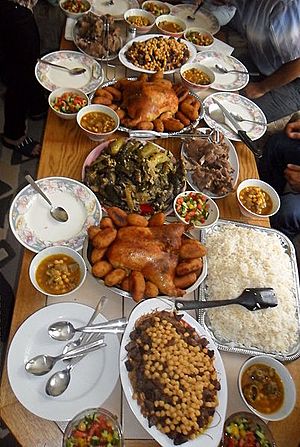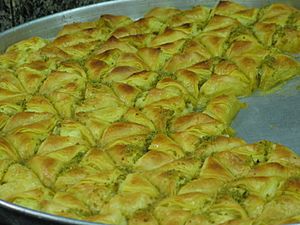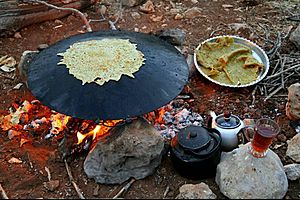Kurdish cuisine facts for kids
Kurdish cuisine (Kurdish: خواردنی کوردی or Xwarina Kurdî) is all about the delicious foods made by the Kurdish people. Their food shares many similarities with their neighbors in Iran, Turkey, Iraq, Syria, and Armenia. Some dishes, like biryani, are even found in places as far away as India. Overall, Kurdish food is a classic example of western Asian cooking.
Contents
Culinary Customs
Kurdish meals often include lots of fresh fruits and vegetables. The main meats are lamb and chicken.
For breakfast, people usually eat flat bread, cheese, honey, and yogurt made from sheep or cow milk. They often drink a glass of black tea. Lunch is typically a stew made with lamb and vegetables, cooked in a tomato sauce. This stew is usually served with rice or flat bread (Naan).
The land where Kurds live, Kurdistan, is great for growing grapes, pomegranates, figs, and walnuts. Kurdish honey is known for its light, clear taste and is often sold with the honeycomb. Dairy products like sheep and cow milk are also very important. Kurds make many kinds of kofta and kubba, which are dumplings filled with meat.
Kurdish cooking uses a lot of fresh herbs.
Sweet black tea is a very popular drink. Another favorite Kurdish drink is "mastow" or "Ava Mast," which is yogurt and salt mixed with water. A fermented version of this drink is called Do (Doogh). Both drinks are often served with herbs like dill or mint.
Some common Kurdish dishes include berbesel, biryani, dokliw, kellane, kullerenaske, kutilk, parêv tobouli, kuki (meat or vegetable pies), and birinç (white rice served with meat, vegetables, or herbs). You'll also find many salads, pastries, and drinks unique to different parts of Kurdistan. Other popular foods are makluba, kofta, shifta, and various soups.
Sawarr is a traditional dish for Kurdish farmers. It's made from wheat grain that is boiled, dried in the sun, and then pounded to remove its outer layer. The wheat is then crushed in a mill and can be boiled and served.
Tapsi is a dish with aubergines, green peppers, courgettes, and potatoes in a slightly spicy tomato sauce. Tashreeb has layers of flat bread soaked in a sauce made with green pepper, tomato, onions, and chilies.
A typical Kurdish breakfast includes cheese, butter, olives, eggs, tomatoes, cucumbers, green peppers, jam (called reçel), and honey, often eaten with kaymak. Sometimes, sausage, baked goods, or even soups are eaten for breakfast. A common Kurdish breakfast specialty is menemen, made with roasted tomatoes, peppers, olive oil, and eggs. Black tea is always served at breakfast.
Dishes and Foods
Dairy Products
In Kurdistan, yoghurt is called mast. It's a very popular fermented dairy product, usually made from cow milk or a mix of sheep and goat milk using traditional methods. Dairy products are a big part of traditional Kurdish food.
Keşk, also known as Kashk, is a fermented and strained sour yogurt. It can be eaten like a cheese or used in soups.
Cheeses
The Kurds make many kinds of cheese, mostly from sheep's milk. Kurdish cheese is traditionally made from raw milk and ripened in goat's skin bags.
- Pista
- Kars kasseri
- Wan herbed cheese
- Torak
- Salamura
- Penîrê Kopê
- Penîrê salk
- Daleme
Soups and Ash
- Şorbeşîr
- Şorbe
- Şorba ser û pê
- Mahluta
- Şorbe nisk (lentil soup)
- Gêrmiya Êrişte (thyme dumpling soup)
- Germîya sîr (winter rice soup)
- Terkhina
- Halimaw
- Milky rice
- Qaziane
- Dokliw
- Yogurt ash
- Sanga sir
Bread
- Kalane bread
- Bersaq
Pilav and Pasta
In Kurdistan, bread comes in many forms, with different ingredients, shapes, and textures.
- Biryani
- Brinji sor
- Girar, Sawer
- Keşke
Pastries
- Borakê Panêr (Cheese Borek)
- Lawzena
- Kurdish Borek (Kürt Böreği)
- Kahi silq
- Pelûl, Paloola
- Tirşyat]
Vegetarian Dishes
- Fasolya
- Kartolên Pîvazan (Kurdish Potato-Onion Sauté)
Vegetable Dishes
- Shlai kolaka
- Tirş û pîvaz (Tirshoopiaz)
- Lobiyên Çêkirî (Kurdish Stewed Beans)
- Bamî (Kurdish okra stew)
Kebabs
- Urfa Kebap
- Ciger şîş
- Cergwez
- Biraşka şîşê
Egg Dishes
- Hêk ê bacanê sor (Eggs in tomato)
Meze and Salads
Stuffed Vegetables
Stuffed vegetables are known as Pelpêç (Sarma) or Pel (Dolma) in Kurdish areas. They are cooked slowly, filling the house with the wonderful smell of fresh herbs and tangy lemons.
- Pel (Dolma)
- Pelpêç (Yaprak or Sarma)
Meat Dishes
For many centuries, lamb and chicken have been the main meats in Kurdish cooking, especially since many Kurds were nomads and herders.
- Doghava
- Ecîn, Çîgê goşt or Kutilka Rihayê (Çiğ köfte)
- Kutilk
- Rihik (Kurdish beef)
- Givîşk (Kurdish rice and beef sausage)
- Biryani ya mirîşka (Kurdish chicken biryani)
- Kepari
- Teşrîba Mirşkê (Chicken with sumac)
- Helîma Ardan (Kurdish Roux)
Fish
Desserts
Non-alcoholic Beverages
- Dew
- Mastaw
- Kurdish coffee (Qehweya Kezwanê or Kafêya Kurdî)
- Ava Sûsê
- Chai (Çay)
- Gulav (Rose Water)
- Lebzîne
- Ava Kişmîş (Raisin drink)
Holiday Celebrations
During the Newroz festival, Kurds love to have picnics in the countryside. They eat traditional foods, often including dolma, and enjoy dancing the traditional Kurdish dance called Halperke.
Kurdish people also enjoy special Eid foods like chicken, rice, dolma, and biryani.
Related Cuisines
See also
 In Spanish: Gastronomía kurda para niños
In Spanish: Gastronomía kurda para niños
 | Anna J. Cooper |
 | Mary McLeod Bethune |
 | Lillie Mae Bradford |




